Photo

날지 못하면 달려라. 달리지 못하면 걸어라. 그리고 걷지 못하면 기어라, 당신이 무엇을 하든 앞으로 가야 한다는 것만 명심해라.
– 마틴 루터 킹 주니어
If you cannot fly then run. If you cannot run, then walk. And, if you cannot walk, then crawl, but whatever you do, you have to keep moving forward.
– Martin Luther King Jr.
✏️ 𝐕𝐨𝐜𝐚𝐛𝐮𝐥𝐚𝐫𝐲:
날다: fly
달리다: run, dash
걷다: walk
기다: crawl
그리고: and
무엇: anything, something
앞: front
가다: go
명심하다: keep (sth) in mind, bear (sth) in mind, be sure to remember
✏️ 𝐆𝐫𝐚𝐦𝐦𝐚𝐫:
1. V~지 못하다 = cannot V
E.g. 날지 못하다 = cannot fly/ be unable to fly
2. V~아/어 라 = used when the speaker demands or directs the listener for doing some work.
E.g. 날지 못하면 달려라 = If you can't fly, run
#KoreanVocabulary #KoreanLanguage #quotesdaily
🌸 🌼 🌻
Support me at: https://koreanlanguageloving.my.canva.site/
#Korean Language#korean langblr#Learn Korean#Study Korean#Hangul#Korean Quotes#positive quotes#한국어 배우기#한국어 단어#한국어 공부하기#한국어배우기#한국어 연습#한국어공부중#한국어#한국어공부해요#한국어공부#한국어공부하기
74 notes
·
View notes
Photo
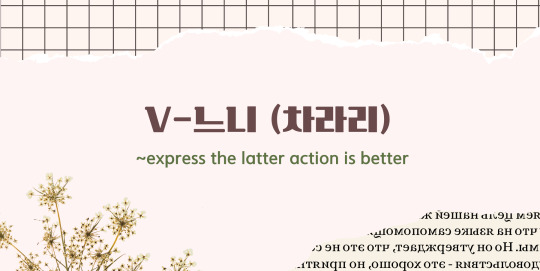


𝐊𝐨𝐫𝐞𝐚𝐧 𝐆𝐫𝐚𝐦𝐦𝐚𝐫: V-느니 (차라리)
✏️ 𝐔𝐬𝐚𝐠𝐞
The grammar pattern V-느니 is used to express a situation where both choices presented in two clauses are unsatisfactory, but the option in the second clause is the comparatively better choice. This pattern is only applicable to verbs.
E.g.
토요일에 집에 있느니 차라리 출근하겠어요.
(I'd rather go to work than stay home on Saturday.)
✏️ 𝐒𝐩𝐞𝐜𝐢𝐚𝐥 𝐍𝐨𝐭𝐞𝐬
(1) V-느니 is frequently accompanied by words such as 차라리 (rather), 그냥 (as it is), and 아예 (from the outset) to emphasize the intended meaning.
E.g.
학교 식당에서 먹느니 차라리 굶겠어요.
(I'd rather starve than eat at the school cafeteria.)
차가 이렇게 막히면 버스를 타느니 그냥 걷는 게 좋겠어요.
(If the traffic is this congested, I'd rather just walk than take a bus.)
친구 숙제를 베껴 쓰느니 아예 안하는 게 낫어요.
(I'd rather not do it at all than copy my friend's homework)
(2) V-느니 can be used interchangeably with V-는 것보다는 V-는 게 낫다 or V-(으)ㄹ 바에야 or V-(으)ㄹ 바에는
E.g.
하루종일 누워만 있느니 차라리 밖으로 나가요.
= 하루종일 누워만 있는 것보다는 차라리 밖으로 나가는 게 낫어요.
= 하루종일 누워만 있을 바에야 차라리 밖으로 나가요.
= 하루종일 누워만 있을 바에는차라리 밖으로 나가요.
(I'd rather go outside than just lie down all day.)
✏️ 𝐌𝐨𝐫𝐞 𝐄𝐱𝐚𝐦𝐩𝐥𝐞𝐬
1. 연습도 제대로 못 하고 대회에 참가하느니 차라리 담 기회에 도전하겠다.
I would rather challenge myself in the next competition than attend a competition without practicing.
2. 시장에 가서 사느니 비싸지만 백화점에서 사야겠어요.
(Even though it is more expensive I’d rather buy at the department store than buy at the market)
3. 성격이 안 좋은 남자와 결혼하느니 혼자 살겠어요.
(I'd rather live alone than marry a man with a bad personality.)
4. 그 사람과 같이 가느니 차라리 혼자 있는 게 낫겠어요.
(I'd rather be alone than go with him)
5. 마음이 맞지 않는 사람과 일하느니 차라리 밤을 세워도 혼자 하는 게 낫어요.
(It's better to stay up all night and do it alone than to work with someone you don't get along with.)
#KoreanGrammar #LearnKorean #Studywithme
🌸 🌼 🌻
Support me at: https://koreanlanguageloving.my.canva.site/
#Korean Grammar#Learn Korean#Study Korean#Korean Language#korean langblr#Hangul#한국어수업#한국어능력시험#한국어 배우기#한국어 연습#한국어공부#한국어 공부하기#한국어배우기#한국어
46 notes
·
View notes
Photo
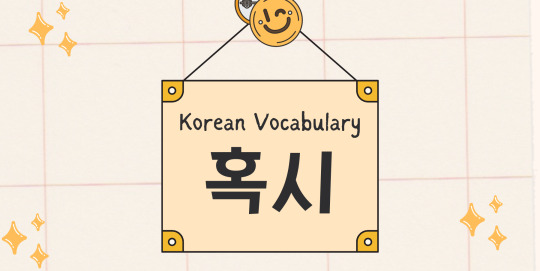


혹시 is a versatile word that is widely used in Korean language. It conveys a sense of low possibility and uncertainty of the speaker. Let's take a closer look at the different ways in which 혹시 can be used:
(1) 혹시 is often used in questions to indicate uncertainty or to seek confirmation from the listener. When used in this way, it can be translated to "by any chance," "I wonder if," or "do you happen to." This usage of 혹시 makes the sentence sound more polite.
E.g.
혹시 선생님 전화 번호 알아요?
(By any chance, do you know the teacher’s phone number?)
혹시 남자친구 있으세요?
(Do you happen to have a boyfriend?)
혹시 지하철이 어디 있는지 아세요?
(I wonder if you know where the subway is?)
(2) 혹시 can be used to soften a request or suggestion, making it more polite. One can use it to ask for a favor.
E.g.
혹시 조금만 더 기다려주실 수 있나요?
(Would it be possible for you to wait just a little bit longer?)
이번 주 토요일에 혹시 시간 괜찮으시면 영화 보러 안 갈래?
(If you have time this Saturday, would you like to go to the movies?)
(3) 혹시 can be used in statement sentences to express uncertainty, conveying the meaning of "maybe" or "perhaps" as one has guessed.
E.g.
나는 기침 소리를 듣고 친구가 혹시 아픈 것은 아닌지 걱정했어.
(I was worried that my friend might be sick when I heard her coughing.)
이번 실수로 회사에서 혹시 잘리게 되는 것은 아닌지 겁이 났어요.
(I was afraid that I might get fired from the company due to this mistake I made.)
In conclusion, 혹시 is a very useful word in Korean for indicating uncertainty and making statements more polite. However, using 혹시 too frequently can make a speaker sound unsure or hesitant. It's best to use it only when necessary and appropriate.
#KoreanLanguage #LearnKorean #KoreanVocabulary
🌸 🌼 🌻
Support me at: https://koreanlanguageloving.my.canva.site/
#Korean Language#Learn Korean#Study Korean#Hangul#korean langblr#Korean Vocabulary#한국어능력시험#한국어 배우기#한국어 단어#한국어배우기#한국어공부#한국어공부중#한국어
75 notes
·
View notes
Photo

될 인연은 그렇게 힘들게
몸부림치지 않아도 이루어져요.
자신을 너무나 힘들게 하는 인연이라면
그냥 놓아주세요.
- 혜민 스님, <멈추면 비로소 보이는 것들>
If a relationship is meant to be, it will comes true
even without struggling so hard.
If a relationship is making you struggle too much,
just let it go.
- Haemin Sunim, <The Things You Can See Only When You Slow Down>
✏️ 𝐕𝐨𝐜𝐚𝐛𝐮𝐥𝐚𝐫𝐲:
되다: turn, become
인연: relationship, connection
그렇다: so, as such, like that
힘들다: hard, difficult, tough
몸부림치다: struggle
이루어지다: be achieved, be accomplished
자신: self, oneself
너무나: too, excessively
그냥: just, as it is, as it stands
놓아주다: let go, set free
#KoreanLanguage #LearnKorean #Studywithme
🌸 🌼 🌻
Support me at: https://koreanlanguageloving.my.canva.site/
#인생명언#Korean Quotes#Korean Phrases#Learn Korean#Study Korean#Korean Language#Korea Langbr#Hangul#한국어공부#한국어 공부하기#한국어 문법#한국어 단어#한국어 연습#한국어#한국어공부중
82 notes
·
View notes
Photo
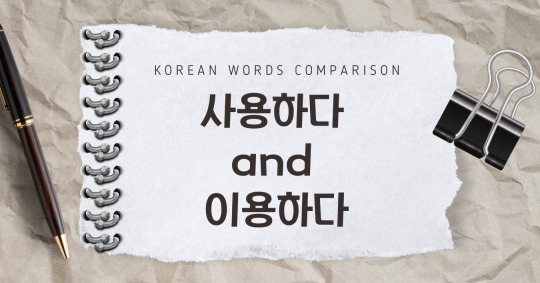
The Korean verbs 사용하다 and 이용하다 both mean "to use" in English, but they have slightly different nuances and contexts of use. Let's break down these two verbs and their meanings in more detail:
(𝟏) 사용하다
The word "사용하다" is derived from the Hanja characters 사용(使用), where "사" means "make/use" and "용" means "use". This verb emphasizes the practical use of something for its intended purpose or function, and it is often used in reference to tools, appliances, or devices.
E.g.
저는 칼을 사용해서 감자 껍질 벗어요.
(I use a knife to peel potatoes.)
옛날에는 비둘기를 통신용으로 사용했던 시기가 있었습니다.
(In the old days, there was a time when pigeons were used as a means of communication.)
- Additionally, 사용하다 can also mean "to hire" or "to employ" someone for a particular purpose.
E.g.
우리 회사에서는 신제품 홍보를 위해 외부 인력을 사용했어요.
(We used external personnel to promote our new products in our company.)
* The term 사용인 (使用人) refers to an employee or a servant.
(𝟐) 이용하다
The term 이용하다 is derived from the Hanja characters 이용(利用), where "이" means "profit/benefit" and "용" means "use". This verb refers to the utilization of something as occasion demands in a way that is helpful or beneficial to oneself. Most of the time, this verb carries the connotation of utilizing something to achieve a positive outcome or benefit.
- 이용하다 is frequently used with public transportation, facilities such as buses, libraries, or services like online shopping.
E.g.
저는 보통 버스를 이용해서 학교에 다닙니다.
(I usually use the bus to go to school.)
이번 학기에는 논문을 쓸 예정이기 때문에 도서관을 자주 이용할 거예요.
(I'm planning to write a thesis this semester, so I'll use the library often.)
- Furthermore, 이용하다 can also be used to describe taking advantage of something or someone for one's own benefit, which may not necessarily be positive. It implies taking advantage of someone or something for personal gain.
E.g.
남의 약점을 이용하지 마라!
(Don't take advantage of others' weakness!)
좋은기회를 이용해서 지수와 친해지고싶네요.
(I want to take advantage of this opportunity to get close to Jisoo.)
Here are two more examples to compare two verbs:
사라는 연필을 사용해서 혜정에게 편지를 썼어요.
(Sara wrote a letter to Hyejeong using a pencil.)
-> The function of a pencil is writing.
사라는 연필을 이용해서 혜정의 목을 찌른 직후 그 자리에서 경찰에게 현행범으로 체포됐어요.
(Sara was caught red-handed on the spot right after she stabbed Hyejeong in the neck using a pencil.)
-> Stabbing someone is not the intended function of a pencil, but Sara still used it to carry out her action.
𝐄𝐱𝐭𝐫𝐚 𝐍𝐨𝐭𝐞𝐬:
- It's worth noting that in some cases, 사용하다 and 이용하다 can be used interchangeably, as they both indicate using something for a specific purpose.
E.g
핸드폰을 이용해서 검색했어요. (O)
핸드폰을 사용해서 검색했어요. (O)
(I searched using my cell phone.)
- However, in other cases, one may be more appropriate than the other, depending on the context.
E.g.
어른에게 존댓말을 이용하도록 합니다 (X)
어른에게 존댓말을 사용하도록 합니다 (O)
(Use honorific language when speaking to adults.)
- Lastly, 쓰다 is a more informal verb that can be used in place of 사용하다 and 이용하다 in many cases and is commonly used in daily conversation.
In conclusion, while both verbs have a similar meaning of "use", 이용하다 specifically refers to using something in a way that benefits oneself or takes advantage of a situation, while 사용하다 is more general and just refers to using something. It is important to consider the context and meaning of the sentence when selecting which verb to use.
#KoreanLanguage #LearnKorean #Studywithme
🌸 🌼 🌻
Support me at: https://koreanlanguageloving.my.canva.site/
#Korean Vocabulary#Learn Korean#Study Korean#Korean Language#korean langblr#Hangeul#hangul#한국어능력시험#한국어 단어#한국어 배우기#한국어배우기#한국어공부#한국어 공부하기#한국어
71 notes
·
View notes
Photo
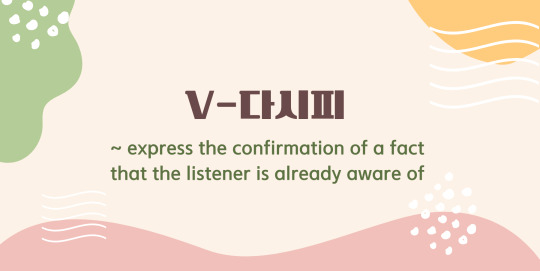

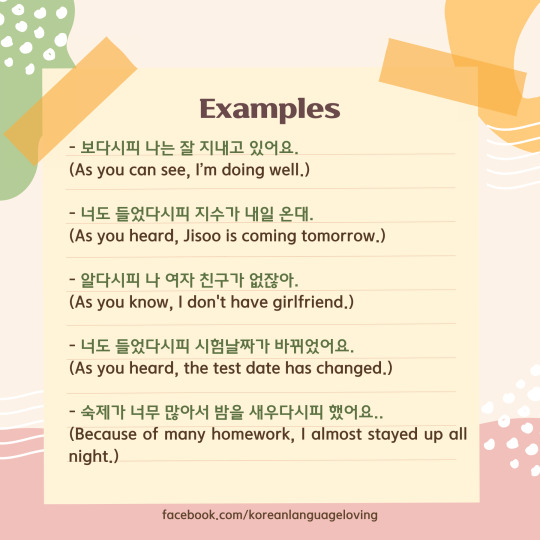
𝐊𝐨𝐫𝐞𝐚𝐧 𝐆𝐫𝐚𝐦𝐦𝐚𝐫: V -다시피
✏️ 𝐔𝐬𝐚𝐠𝐞
- This expression is used to confirm a fact that the listener already knows.
- It can be translated as “As you can…” or “As you…”
E.g.
알다시피 이 세상에 완벽한 것이란 없어요.
(As you know, there's nothing perfect in the world.)
✏️ 𝐒𝐩𝐞𝐜𝐢𝐚𝐥 𝐍𝐨𝐭𝐞𝐬
(1) V-다시피 is often combined with verbs that express feeling or perception, such as '알다' (know), '보다' (see), '듣다' (hear), '느끼다' (feel), '짐작하다' (guess), '예상하다' (expect), and so on
E.g.
우리 모두 느끼다시피 지금 날씨에는 어디에도 갈 수 없어요.
(As we all feel, we can't go anywhere in this weather.)
예상하다시피 7월은 아이스크림 제조업체 생산량이 가장 많은 달여요.
(As we expect, July is the month with the highest production volume of ice cream manufacturing companies.)
(2) This grammar can be use with past tense (었/았/였) and supposition (겠)
E.g.
배웠다시피 경주는 신라의 옛 수도이에요
(As you learnt, Gyeongju was the ancient capital of the Silla dynasty.)
너도 짐작하겠다시피 민수가 그 제안을 수락했어
(As you can guess, Minsu accepted the offer.)
(3) When used to confirm a fact that both the speaker and listener are already know, this grammar structure can be interchanged with -듯이 grammar without major the meaning.
E.g.
여러분도 들었다시피 이 행사에서는 만 12세 이하 아이들만 참여할 수 있습니다.
= 여러분도 들었듯이 이 행사에서는 만 12세 이하 아이들만 참여할 수 있습니다.
(As you heard, this event is only open to children under the age of 12.)
(4) It is important to note that V-다시피 하다 has a completely different meaning than V-다시피. V-다시피 하다 is used to describe a situation that is "practically", "almost like", or "nearly" something else. The action is very close to another action but is not exactly the same.
E.g.
요즘 시험이 있어서 도서관에서 살다시피 했어요.
(I practically lived in the library because I had the exam these days.)
그 분은 매일 점심으로 샌드위치를 먹다시피 해요.
(He almost eats a sandwich for lunch every day.)
✏️ 𝐌𝐨𝐫𝐞 𝐄𝐱𝐚𝐦𝐩𝐥𝐞𝐬
1. 요즘 바빠 보이네요.
- 네, 보다시피 눈 코 뜰 새 없이 바빠요.
(You look busy these days.
- Yes, as you can see, I'm super busy.)
2. 이 사진에서 보다시피 출근시간에는 길이 너무 막혀요.
(As you can see in this photo, the road is very congested during rush hour.)
3. 알다시피 외국어 실력은 짧은 시간에 완성되는 것이 아닙니다.
(As you know, foreign language proficiency is not something that can be achieved in a short period of time.)
4. 여러분도 들었다시피 이 행사에서는 담배를 피울 수 없습니다.
(As you heard, you can't smoke at this event.)
5. 짐작하다시피 결과는 완전히 다른 이야기가 되어 있어요.
(As you can probably guess, the outcome is a completely different story.)
#KoreanGrammar #LearnKorean #Studywithme
🌸 🌼 🌻
Support me at: https://koreanlanguageloving.my.canva.site/
#Korean Language#Korean langblr#Study Korean#Learn Korean#Korean Grammar#Hangul#한국어공부#한국어공부중#한국어 배우기#한국어능력시험#한국어 연습#한국어배우기#한국어
46 notes
·
View notes
Photo

기적도 조금은 시간이 걸린단다.
(Even miracles take a little time.)
- 신데렐라 - Cinderella
✏️ 𝐕𝐨𝐜𝐚𝐛𝐮𝐥𝐚𝐫𝐲:
기적: miracle
시간: time, hour
걸리다: hang, take (time)
조금: some, a little
🌸 🌼 🌻
Support me at: https://koreanlanguageloving.my.canva.site/
#한국어공부중#한국어공부#한국어 공부하기#한국어#한국어 단어#Korean Quotes#Korean Phrases#한국어배우기#한국어배우#Korean Language#korean langblr#Learn Korean#Hangul#Study Korean
20 notes
·
View notes
Photo

"많관부" (manh-gwan-bu) is a Korean slang word. It is short for "많은 관심 부탁드립니다" which can be translated as "Please give me a lot of attention" or "Please show me lots of support."
This phrase is often used by Korean celebrities on social media to ask for fans' attention and support for their projects such as upcoming film or album release.
It is worth noting that "많관부" is considered a slang word and not a formal expression, so it may not be appropriate to use in all contexts.
🌸 🌼 🌻
Support me at: https://koreanlanguageloving.my.canva.site/
#한국어 공부하기#한국어공부중#한국어공부#한국어 어휘#한국어 문법#한국어 연습#한국어#hangul#learn korean#study korean#korean language#Korean langblr#Korean Vocabulary List
27 notes
·
View notes
Photo



𝐊𝐨𝐫𝐞𝐚𝐧 𝐆𝐫𝐚𝐦𝐦𝐚𝐫: A/V -아/어(서) 죽겠다
✏️ 𝐔𝐬𝐚𝐠𝐞
This expression is commonly used in informal settings to emphasize or exaggerate one's emotions or state of being. The phrase "죽겠다" (going to die) is a metaphorical exaggeration of speaker's emotional state, even though they are not actually going to die. It often expresses an extreme emotion, whether it's joy, excitement, surprise, shock, or frustration.
It can be translated as “so … that I could die”, “I will die from…”, and so on.
E.g.
점심을 안 먹어서 배고파서 죽겠어요.
(Because I didn't eat lunch, I'm so hungry that I could die.)
-> the speaker is emphasizing the intensity of their hunger, he/ she is not actually going to die.
✏️ 𝐒𝐩𝐞𝐜𝐢𝐚𝐥 𝐍𝐨𝐭𝐞𝐬
(1) This expression is considered informal and should only be used in casual settings among friends or people you are close to. It would be inappropriate to use this expression in formal or professional contexts.
(2) The use of "서" in the expression is optional and can be omitted without changing the meaning of the sentence.
E.g.
무서워서 죽겠어요.
= 무서워 죽겠어요.
(I'm scared to death.)
(3) Additionally, "아/어(서) 죽을 것 같다" and "아/어(서) 죽을 지경이다" can be used in place of "아/어(서) 죽겠다" without a change in meaning. However, "죽겠어요" is the most commonly used form of the expression.
E.g.
지루해 죽겠어요.
= 지루해 죽을 것 같아요.
= 지루해 죽을 지경이에요.
(I'm bored to death)
✏️ 𝐌𝐨𝐫𝐞 𝐄𝐱𝐚𝐦𝐩𝐥𝐞𝐬
1. 여친을 너무 보고 싶어죽겠어요.
(I miss my girlfriend so much that I'm going to die.)
2. 친구들이 다 집에 가서 혼자 남겨져서 외로워 죽겠어요.
(I'm dying of loneliness because all my friends went home, and I were left alone.)
3. 요즘 좋은 일들이 많아서 행복해서 죽겠어요.
(There are so many good things happening these days that I'm extremely happy (that I could die).)
4. 시험 준비를 하느라 밤을 새서 지금 너무 피곤해서 죽겠어요.
(I've been up all night preparing for the exam, so I'm dead tired right now.)
5. 이 강아지가 귀여워서 죽겠어요.
(This puppy is so cute (that I could die).)
#KoreanLanguage #KoreanGrammar #LearnKorean
🌸 🌼 🌻
Support me at: https://koreanlanguageloving.my.canva.site/
#Korean Grammar#Learn Korean#Study Korean#Korean Language#korean langblr#한국어공부중#한국어 공부하기#한국어공부#한국어 단어#한국어 문법#한국어#한국어수업#한국어배우기#한국어배우
31 notes
·
View notes
Video
youtube

비도 오고 그래서 네 생각이 났어
생각이 나서 그래서 그랬던거지
별 의미 없지
우산 속에 숨어서 네 집을 지나쳐
그 날의 감정을 다시 느껴보고파서
It was raining, so I thought of you.
Because I thought of you, I was like that
It doesn't mean anything.
I hid under an umbrella and passed by your house
because I wanted to feel the emotions of that day again.
Heize – You, Clouds, Rain (비도 오고 그래서) (feat. Shin Yong Jae)
✏️ 𝐕𝐨𝐜𝐚𝐛𝐮𝐥𝐚𝐫𝐲:
비: rain
오다: to come
그래서: so, therefore
생각: thought
나다: to come up, to occur
그렇다: to be like that
별: particular, specific
의미: meaning
없다: to not exist, to be absent
우산: umbrella
속: inside
숨다: to hide
집: house
지나치다: to pass by
그 날: that day
감정: emotion, feeling
다시: again
느끼다: to feel
* 보고파서 is a poetic term working as the short of "보고 싶어서"
✏️ 𝐆𝐫𝐚𝐦𝐦𝐚𝐫:
1. A/V-아/어서 = because/ and ~ Clause Connector
🌸 🌼 🌻
Support me at: https://koreanlanguageloving.my.canva.site/
#Korean Language#korean langblr#Korean Quotes#Korean Phrases#Korean Songs#Kpop Songs#Heize#Learn Korean#Study Korean#한국어 공부하기#한국어공부중#한국어공부#한국어 단어#한국어
6 notes
·
View notes
Photo

Have you ever wondered about the differences between the Korean words 같이 and 함께? While both of these words can be translated to "together" in English, there are subtle nuances in their meanings that can be important to understand.
𝐈. 𝐒𝐢𝐦𝐢𝐥𝐚𝐫𝐢𝐭𝐢𝐞𝐬 𝐛𝐞𝐭𝐰𝐞𝐞𝐧 같이 𝐚𝐧𝐝 함께:
(1) Both 같이 and 함께 share the same meanings of "together", "with" or "along with", and are often interchangeable.
(2) Both words are frequently used in conjunction with other words like 와/과, 하고, or (이)랑 in a sentence.
For instance:
승규는 가족들과 같이 한집에 살았어요.
= 승규는 가족들과 함께 한집에 살았어요.
(Seunggyu lived in the same house with his family)
𝐈𝐈. 𝐃𝐢𝐟𝐟𝐞𝐫𝐞𝐧𝐜𝐞𝐬 𝐛𝐞𝐭𝐰𝐞𝐞𝐧 같이 𝐚𝐧𝐝 함께:
(1) 같이 (pronounced as 가치)
같이 conveys the idea of "together" in a more casual and informal way. It is commonly used in everyday conversations among friends and peers. This word is usually used when referring to people.
E.g.:
같이 놀러 갈래?
(Do you want to go play together?)
저녁 같이 먹자.
(Let's eat dinner together.)
(2) 함께
함께 is a more formal and polite word, often used in written or formal contexts, such as in a workplace or in a speech. It describes doing something together, but it can also be used to express a sense of togetherness or unity.
E.g.
상사와 저녁 식사를 함께 했습니다.
(I had dinner with my boss.)
반 친구들과 함께 토론하며 문제를 해결해 보세요.
(Discuss with your classmates and solve the problem.)
- One important difference is that 함께 can also be used with objects, not just with people.
E.g.
이 약은 따뜻한 물과 함께 마셔야 합니다.
(This medicine should be taken with warm water.)
그 와인은 생선 요리와 함께 마시면 좋아요.
(That wine makes a good accompaniment to fish dishes.)
--> 같이 cannot be used in these cases.
In summary, 같이 has a casual and friendly tone and is commonly used in everyday conversations, whereas 함께 has a more formal and serious tone and is typically used in written language or formal situations. Additionally, 함께 can be used for both people and objects, while 같이 only refers to people.
🌸 🌼 🌻
Support me at: https://koreanlanguageloving.my.canva.site/
#Korean Language#korean langblr#Learn Korean#Study Korean#Hangul#Korean Vocabulary#한국어능력시험#한국어 배우기#한국어 단어#한국어배우기#한국어#한국어 공부하기#한국어공부중#한국어공부
55 notes
·
View notes
Photo



𝐊𝐨𝐫𝐞𝐚𝐧 𝐆𝐫𝐚𝐦𝐦𝐚𝐫: V-아/어 버리다
✏️ 𝐔𝐬𝐚𝐠𝐞
The grammar form "아/어 버리다" is used to indicate the complete and thorough finishing of an action or event. It means that nothing is left unfinished or incomplete after the action is completed. This form can convey a variety of emotions and attitudes towards the finished action, such as regret, relief, surprise, or anger. It can only be used with verbs.
E.g.
어제 저녁에 피자를 먹어 버렸어요.
(I ate all the pizza for dinner yesterday.)
--> Emphasizes that the speaker ate pizza and completed the action without leaving anything undone. Depending on the context, this could convey a feeling of regret, relief, surprise, or anger about eating all of the pizza.
✏️ 𝐒𝐩𝐞𝐜𝐢𝐚𝐥 𝐍𝐨𝐭𝐞𝐬
Because this expression can indicate a wide variety of emotional states, it is important to understand the emotional state of the speaker from the particular context.
- Regret:
그 사람이 결국 떠나 버렸어요. 그래서 너무 섭섭해요.
(That person ended up leaving. That's why I'm so sad.)
- Relief:
그 사람이 드디어 떠나 버렸어요. 그래서 너무 시원해요.
(That person finally left. So, I feel so relieved.)
- Surprise:
그 사람이 통화 중간에 전화를 끊어 버렸어요. 그래서 깜짝 놀랐어요.
(That person hung up the phone in the middle of the call. So I was really surprised.)
- Anger:
사다 놓은 케이크를 먹지 않았지만 동생이 다 먹어 버렸어요. 그래서 너무 화가 났어요.
(I didn't eat the cake I bought, but my brother ate it all. So I was so angry.)
✏️ 𝐌𝐨𝐫𝐞 𝐄𝐱𝐚𝐦𝐩𝐥𝐞𝐬
1. 남자 친구랑 헤어졌다면서요?
- 네, 그래서 그 사람이 준 물건들을 친구들에게 다 줘 버렸어요.
(Is it true that you broke up with your boyfriends?
- Yes, so I gave away all things that he gave me to my friends.)
2. 면접 볼 때 너무 긴장해서 실수를 해 버렸어요.
(I was so nervous during the interview that I made a mistake.)
3. 공항에 너무 늦게 도착해서 비행기가 떠나 버렸어요.
(I arrived at the airport so late that my flight left.)
4. 친구 생일 선물을 사느라고 돈을 다 써 버렸어요.
(I spent all my money buying my friend's birthday present.)
5. 10분밖에 안 늦었는데 친구는 저를 기다리지 않고 가 버렸어요.
(I was only 10 minutes late, but my friend left without waiting for me.)
#KoreanGrammar #KoreanLanguage #Studywithme
🌸 🌼 🌻
Support me at: https://koreanlanguageloving.my.canva.site/
#Korean Grammar#Learn Korean#Study Korean#Korean Language#korean langblr#한국어수업#한국어 문법#한국어 배우기#한국어 공부하기#한국어공부중#한국어#hangul#한국어공부
35 notes
·
View notes
Photo

아무리 바람이 세차게 불어도
산은 바람에 고개를 숙일 수 없다
No matter how the wind howls,
the mountain cannot bow to it
- from Disney Movie: Mulan
✏️ 𝐕𝐨𝐜𝐚𝐛𝐮𝐥𝐚𝐫𝐲:
아무리 (adv): no matter how, however, whatever
바람 (n): wind
세차다 (adj): strong, rough
불다 (v): blow
산 (n): mountain
고개 (n): head
숙이다 (v): bow, bend
✏️ 𝐆𝐫𝐚𝐦𝐦𝐚𝐫:
1. (아무리) A/V-아/어도 grammar = even if, no matter how ~a situation occurs regardless of the previous action
E.g.
아무리 바람이 세차게 불어도 = No matter how strong the wind blows
2. V-(으)ㄹ 수 없다 grammar = can't (do V)
E.g.
고개를 숙일 수 없다 = can't bow down
🌸 🌼 🌻
Support me at: https://koreanlanguageloving.my.canva.site/
#Korean Quotes#Korean Phrases#Learn Korean#Study Korean#Hangul#Motivational Quotes#Disney Quotes#Korean Language#korean langblr#인생명언#한국어공부중#한국어 공부하기#한국어공부#한국어 문법#한국어#한국어능력시험#한국어배우기#한국어배우#한국어 배우
106 notes
·
View notes
Photo

In the Korean language, there are words that are similar in meaning but have slightly differences in usage, and two of those words are "새로운" and "새" both meaning "new."
(1) Firstly, "새" refers to something that is newly introduced or appearing for the first time. It is used to describe something that has not been present before.
E.g.
"새색시" refers to a new bride who has just appeared in a household
"새 친구" refers to a new friend you have just made
(2) On the other hand, "새로운" refers to something that already exists but has undergone significant changes or improvements, emphasizing noteworthy transformation.
E.g.
"새로운 관점" refers different perspective than before
"새로운 느낌" refers different feeling than before
𝐌𝐨𝐫𝐞 𝐞𝐱𝐚𝐦𝐩𝐥𝐞𝐬:
- 새 얼굴 vs 새로운 얼굴 (new face)
"(모임의) 새 얼굴" means a new member of the group, while "새로운 얼굴" refers to a face that looks different from usual, such as with makeup or plastic surgery.
- 새 셔츠 vs 새로운 셔츠 (new shirt)
"새 셔츠 " means a new shirt from the store, while "새로운 셔츠" refers to a shirt that has been reformed to look like a different shirt.
𝐍𝐨𝐭𝐞𝐬:
- If there is a revolutionary change, then "새" is more appropriate. This type of transformation is not regional or insignificant; it is a fundamental and revolutionary change.
E.g. the phrase "새 사람" can refer to a person who has undergone a significant change or a rebirth.
- Additionally, "새" cannot be used as a predicate, while "새로운" in the form "새롭다" can function as a predicate.
E.g. 이 책은 언제 읽어도 새롭다 (This book is always new to me.)
- When referring to a new season, such as the new spring or fall, "새 봄" and "새 가을" are used, not "새로운 봄" or "새로운 가을", because it is a new season different from the previous years.
In conclusion, "새" (sae) means something new that has appeared for the first time, while "새로운" (saeroun) means something that has already appeared, but has become better or different, in other words, it implies a noticeable change.
#KoreanVocabulary #LearnKorean #한국어공부 #Studywithme
🌸 🌼 🌻
Support me at: https://koreanlanguageloving.my.canva.site/
#한국어공부중#한국어공부해요#한국어공부하기#한국어 공부하기#한국어공부#한국어#hangul#korean vocabulary#Korean Vocabulary List#Learn Korean#Study Korean#korean langblr#한국어수업#한국어 배우기#한국어배우
51 notes
·
View notes
Photo
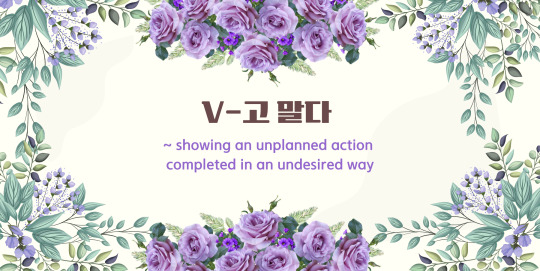


𝐊𝐨𝐫𝐞𝐚𝐧 𝐆𝐫𝐚𝐦𝐦𝐚𝐫: V-고 말다
✏️ 𝐔𝐬𝐚𝐠𝐞
- This expression describes an event or action that was not planned and continued until it was finished, but the speaker did not want it to happen. Thus, it includes the speaker's feeling of regret or sadness about the outcome. Only a verb can be used before this expression.
- It can be translated as "end up doing something" or "wind up doing something”.
E.g.
급하게 뛰어가다가 넘어지고 말았어요.
(I ran in a hurry and ended up falling down.)
✏️ 𝐒𝐩𝐞𝐜𝐢𝐚𝐥 𝐍𝐨𝐭𝐞𝐬
(1) If you want to use an adjective, you need to convert it into a verb by using the grammar "A-아/어지다" to mean "to become A".
E.g.
담배를 많이 피우더니 건강이 나쁘고 말았어요. (X)
->담배를 많이 피우더니 건강이 나빠지고 말았어요 (O)
(I smoked a lot and my health ended up getting worse)
(2) Adverbs such as "결국" (in the end, eventually), "드디어" (at last, finally), "마침내" (finally, after all), and "끝내" (ultimately, finally) can be added to emphasize the situation.
E.g.
아무리 힘들어도 울지 않으려고 참았으나 결국 울고 말았어요.
(No matter how hard it was, I tried not to cry, but eventually I ended up crying.)
(3) The expression ‘고 말다’ can also refer to the subject's strong will or intention to do something. In such cases, it is often combined with expression that indicates intention, such as -겠 or -(으)ㄹ 테니까, to form expression such as -고 말겠다. In addition, these forms are often used together with adverbs such as 꼭 (firmly, tightly), 반드시 (without fail, certainly) and 기필코 (by all means, at any cost).
E.g.
올 여름에는 꼭 살을 빼서 그 원피스를 입고 말겠어요.
(I will definitely lose weight this summer to wear that dress.)
(4) "V-고 말다" can also be combined with "아/어 버리다" to form "-아/어 버리고 말았다". This is used to emphasize the speaker's feeling of regret and sorrow.
E.g.
피자를 먹고 말았어요.
피자를 먹어 버리고 말았어요.
Both mean "I ended up eating pizza," but the second sentence conveys more regret over the situation.
✏️ 𝐌𝐨𝐫𝐞 𝐄𝐱𝐚𝐦𝐩𝐥𝐞𝐬
1. 왜 이렇게 늦었어요?
- 늦잠을 자서 기차를 놓치고 말았어요.
(Why are you so late?
- I overslept and ended up missing the train.)
2. 안나 씨, 이 과자를 다 먹었어요? 다이어트 한다고 하지 않았어요?
- 하 개만 먹으려고 했는데 먹다 보니까 과자를 다 먹고 말았네요.
(Anna, did you eat all these cookies? Didn't you say you were on a diet?
- I was going to eat one, but after having one I ended up eating them all.)
3. 남자 친구와 싸워서 헤어지고 말았어요.
(I fought with my boyfriend and ended up breaking up.)
4. 버스에서 잠이 들었어서 역을 지나치고 말았어요.
(I fell asleep on the bus and ended up passing the train station.)
5. 갑자기 비가 내려서 옷이 다 젖고 말았어요.
(It suddenly rained, and all my clothes ended up getting wet.)
#KoreanGrammar #한국어공부 #StudyKorean --
🌸 🌼 🌻
Support me at: https://koreanlanguageloving.my.canva.site/
#studying Korean#Korean#KoreanGrammar#Korean Grammar#learn korean#language study#Hangul#한국어공부#한국어#한국어능력시험#한국어배우기#한국어배우#한국어공부중
42 notes
·
View notes
Photo

Both 피곤하다 and 힘들다 are Korean words that express feelings of exhaustion or fatigue, but there is a slight difference between the two.
(1) Firstly, "피곤하다" is commonly used to describe physical tiredness or sleepiness. It's used when you feel physically drained after doing something tiring or strenuous, such as working out, studying, or performing energy-consuming tasks. You feel a need to rest and recover your energy.
E.g.
나는 너무 피곤해서 집에 가자마자 잠이 들었어요.
(I was so tired that I fell asleep as soon as I got home.)
어제 잠을 설쳤더니 피곤해요.
(I'm tired because I couldn't sleep last night)
--> You can feel 피곤하다 in your body, and it is not related to mental exhaustion.
(2) On the other hand, "힘들다" refers to both mental or physical exhaustion caused by difficulty or hardship. It's used to describe a challenging task or a difficult situation that requires a lot of effort.
E.g.
요즘 일이 너무 바빠서 머리가 지끈거리고 힘들어요.
(I'm mentally exhausted and stressed because I'm too busy with work these days.)
어려운 시험을 쳤더니 힘들어요.
(I got tired after a hard examination.)
--> You can feel 힘들다 in both your body and mind, and it can be due to physical or mental challenges.
𝐍𝐨𝐭𝐞𝐬:
- It's worth noting that these two words can sometimes be used interchangeably without a significant change in meaning.
E.g.
지수는 너무 오래 걸어서 피곤하다고 투덜댔어요.
지수는 너무 오래 걸어서 힘들다고 투덜댔어요.
(Jisoo complained that she was tired because she walked too long.)
--> Both "피곤하다" and "힘들다" can be used to describe feeling tired after a long walk. However, "힘들다" emphasizes the hardship and difficulty of the situation.
- Lastly, it's important to know that "힘들다" can also be used as an adjective to describe something that is hard or difficult. Here are some examples:
E.g.
남편은 요즘 너무 바빠서 얼굴 보기도 힘들어요.
(My husband is so busy these days that it's hard to see his face.)
대학 나와도 취직하기 힘들어요.
(It's hard to get a job even if you go to college.)
--> In these cases, you cannot use 피곤하다.
In summary, "피곤하다" refers to physical exhaustion after doing energy-consuming tasks, whereas "힘들다" refers to physical and mental exhaustion after finishing challenging tasks, and it also conveys the meaning of hardship and difficulty.
--
🌸 🌼 🌻
Support me at: https://koreanlanguageloving.my.canva.site/
#Korean Language#korean langblr#Learn Korean#Study Korean#Hangul#Korean Vocabulary#한국어능력시험#한국어 단어#한국어 배우기#한국어배우기#한국어공부중#한국어공부#한국어#한국어수업
70 notes
·
View notes
Photo

만우절 (Manu-jol) is the Korean equivalent of April Fool's Day. It is celebrated on April 1st every year and is a day for playing pranks and practical jokes on friends and family.
The term "만우절" is derived from the Sino-Korean character "萬愚節" in which:
萬 (man), meaning "ten thousand" or "great many";
愚 (yu), meaning "foolish" or "stupid";
and 節 (jeol), meaning "holiday," "festival," or "occasion."
Together, it could be translated as "the day of ten thousand fools" or "the day of countless foolish people."
Just like in other countries, on April Fool's Day, people in South Korea play practical jokes and hoaxes to each other. This day is often celebrated between friends, family, and colleagues in a light-hearted and humorous way.
--
🌸 🌼 🌻
Support me at: https://koreanlanguageloving.my.canva.site/
#만우절#April Fools#Korean Language#Korean Vocabulary#Learn Korean#Study Korean#language study#korean langblr#hangul#한국어공부중#한국어공부해요#한국어공부하기#한국어 공부하기#한국어공부#한국어 단어#한국어능력시험#한국어 배우기#한국어배우기#한국어
26 notes
·
View notes